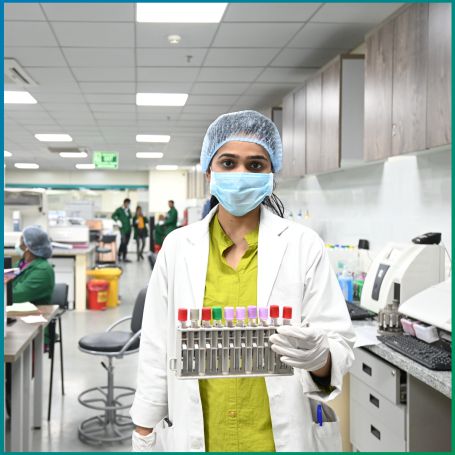
Bone marrow is the soft, spongy tissue inside your bones where blood cells are produced, including red blood cells, white blood cells, and platelets.

The C/S Bone Marrow Test, also known as the Culture and Sensitivity Test for Bone Marrow, is a diagnostic procedure used to identify infections within the bone marrow and assess their susceptibility to treatment.The bone marrow plays a vital role in maintaining a healthy blood cell count and immune system. When an infection, malignancy, or other health condition affects the bone marrow, it can lead to serious complications such as anemia, leukopenia, or thrombocytopenia. A C/S Bone Marrow Test helps doctors identify the specific cause of these abnormalities and determine the best course of treatment.
1] Preparation: The patient is typically asked to lie down on their stomach or side. The area where the needle will be inserted is cleaned with an antiseptic solution to reduce the risk of infection.
2] Bone Marrow Aspiration: The procedure begins with a local anesthetic being administered to numb the area where the needle will be inserted. A hollow needle is then inserted into the iliac crest (part of the hip bone) or another suitable site to withdraw a small sample of bone marrow fluid. In some cases, the procedure may be guided by ultrasound or CT scan to ensure proper placement of the needle.
3] Bone Marrow Biopsy: In some cases, a biopsy (a small piece of bone tissue) may also be taken along with the aspiration to provide additional information about the bone marrow’s structure.
4] Laboratory Analysis: The bone marrow sample is sent to the lab, where it is cultured to detect any microbial growth. The culture may reveal bacterial, fungal, or mycobacterial infections. In some cases, the sample may also be tested for viral infections such as HIV or hepatitis.
5] Sensitivity Testing: Once pathogens are identified, a sensitivity test is performed to determine the most effective antibiotics or antifungal treatments. This helps doctors prescribe targeted therapy that is more likely to be effective.
1] Positive Culture: If bacteria, fungi, or viruses are detected, the result will specify the type of organism. Sensitivity testing will determine which antibiotics or antifungals are most effective against the infection.
2] Negative Culture: A negative result means no pathogens were found, but it does not rule out all possible conditions. Further testing may be needed for other causes of bone marrow abnormalities.
3] Elevated White Blood Cells: High white blood cell (WBC) counts in the marrow can indicate an infection, or it could be a sign of leukemia or another hematologic disorder.
4] Other Abnormalities: If cancer cells or abnormal bone marrow cells are detected, additional tests will be required to confirm the diagnosis and guide treatment.
Choosing best pathology lab test in Pune for your C/S Bone Marrow Test ensures that you receive the highest standard of care and accuracy in diagnosing and managing bone marrow-related conditions. We utilize advanced diagnostic technologies and state-of-the-art laboratory techniques to provide reliable results that help guide your treatment plan. Our team of experienced healthcare professionals is dedicated to making the process as comfortable and seamless as possible, from expert sample collection to rapid result turnaround.
At Diagnopein, we understand the importance of precise testing for bone marrow disorders, infections, and malignancies, and we are committed to offering personalized care to each patient. Whether you require home sample collection for convenience or need guidance on interpreting your results, our customer-focused approach ensures that you receive timely, effective, and compassionate support throughout your diagnostic journey. Trust Diagnopein for accurate, efficient, and affordable bone marrow testing.
1. Culture Method
2. Sample
3. Colony Count
4. Organism(s) Isolated
5. Culture Report: Culture yields growth of
6. Culture isolated after 7 days :
7. Culture isolated after 14 days:
8. Culture isolated after 21 days:
9. Ampicillin
10. Amikacin
11. Amoxicillin clavulanate
12. cefoperazon+sulbactam
13. Cefuroxime
14. Cefepime
15. Cefotaxime
16. Ciprofloxacin
17. Ertapenem
18. Gentamicin
19. Imipenem
20. Meropenem
21. Norfloxacin
22. Nitrofurantoin
23. Piperacillin-tazobactam
24. Trimethoprim-Sulfamethoxazole (Cotrimoxazole)
A sample of bone marrow is obtained through a procedure called aspiration (a needle is inserted into the bone), and the fluid is sent to a lab for culture and sensitivity testing.
It helps diagnose bone marrow infections, cancer (e.g., leukemia), anemia, sepsis, and complications from chemotherapy or other treatments that impact the bone marrow.
It helps diagnose infections affecting the bone marrow, assess bone marrow disorders like leukemia, and guide the treatment of infections by identifying effective antibiotics or antifungals.
Preparation typically involves discussing any medications you're taking with your doctor. No special fasting or other preparations are usually required for the test.